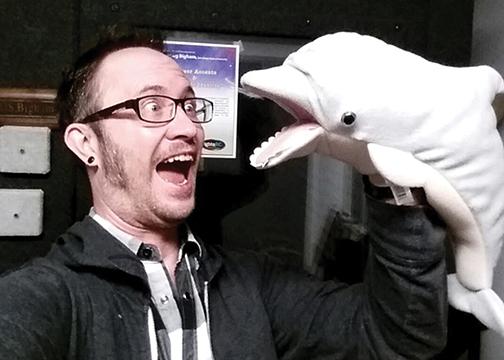An assistant professor to eight linguistic classes at San Diego State, Douglas S. Bigham became enamored with language when he was a young child.
“I was exposed to a Spanish program in second or third grade, and it was so fascinating that there was this whole other system I could use,” Bigham said.
His interest expands beyond one specific language to linguistics, or the scientific study of language as a whole.
He’s currently researching the phonetics of language and the way people express different identities within Southern California culture in something called the San Diego Project.
“If I asked you to talk to me like a surfer, how would you change your language if I then asked you to talk like a nerd?” he said.
Bigham has noticed the way bilingual speakers choose to speak in English when imitating a surfer.
“Clearly there (are) plenty of people who surf in Southern California, so why is it when I tell you to sound like a surfer you also end up thinking about a white dude?” he said.
Though he said it’s too early in the study to make any strong claims, he’s intrigued by the politics of language and identity and the way the two overlap.
Bigham has collaborated with students and colleagues on the project, including former linguistics student Mechelle Negrete.
“It was a very positive work environment and so interesting to classify and break down stereotypes,” Negrete said.
In addition to his research with the San Diego Project, Bigham teaches sociolinguistics, queer linguistics, and phonology, among others.
His favorite class to teach is Invented Languages: Klingon and Beyond.
“We talk about languages that aren’t natural and people have made up, usually for plots of movies or books,” Bigham said. “Or (about how) back in the 1800s there was this big push to create a language that the whole world could use as a second language, which eventually failed.”
One of the many subjects students learn about is Klingon, which was constructed by Mark Okrean and first appeared in the Star Trek movies.
Bigham said an interesting aspect of the language is the subject-verb placement in a sentence. Instead of “Bigham drove the car,” Klingon speakers would say “The car drove Bigham.”
Of the 7,000 or so languages that exist on Earth, there are only about three or four of them that place the subject and verb in that order. Considering Klingon is supposed to be spoken by aliens, Bigham said Okrean purposefully used the least common pattern that exists.
Bigham’s love for language stems from the way it has endless creative potential.
“It’s the one thing that makes us human, and that’s pretty fascinating,” he said.












